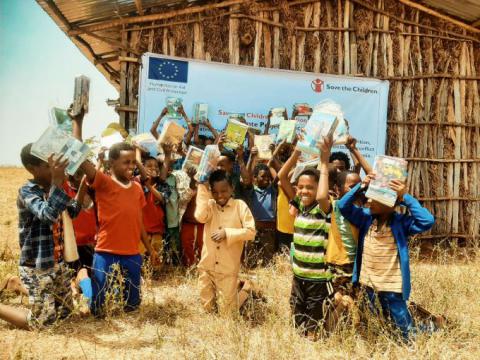Education in Emergencies (EiE) - Success Story
Summery
Save the Children has been responding to the humanitarian emergency needs in the East Wollega zone of Oromia, following the prolonged conflict in areas of the Benishangul Gumuz, Amhara, and Western Oromia regions. Since 1st June, the ECHO-funded integrated multi-sector life-saving response project has been implemented over the past three years across different thematic areas (WASH, Nutrition, Education, protection, and COVID - 19 treatment) and different locations, including Nekemte town, Haro Limu, and Sasiga Woreda.
Following a conflict-prolonged situation, many children drop out of school, schools are devastated, and teachers are displaced. Education in Emergencies (EiE) is one of the project’s thematic focuses and has the goal of providing crisis-affected primary school children access to quality and inclusive education opportunities (both formal and non-formal). The project promotes a safe and protective environment for children in emergencies and establishes pathways to formal education.
Samira Aliyi's Story
In Oromia’s Sasiga District, Hakamulis Village, conflict and violence disrupted the lives of Samira Aliyi and her friends Urji Fami and Seko Reshad. In this village one of the children, we worked with is Samira. She is a 12 years old child and she is from one of the rural villages in the area called Soge. Samira was a happy child and loves learning and spending her time in school with her friends before the situation changed due to the conflict. They gave this account:
“We were happy friends in grade 4 until a conflict arose in our village in 2018, and school was suspended due to inter-community conflict. Because of the conflict, our three friends were forced to flee from our homes in Soge. Following the conflict, our lives changed into activities such as looking for animals, gathering firewood, and sometimes trading in the market. Even if a school was available in our displaced location, our families could not afford to purchase school supplies such as exercise books, pens, pencils, and school bags.”
For Samira and other children in the area, Save the Children has been providing different capacity building for teachers on the psychosocial impact of emergencies, awareness on back to school, minimizing dropout and supporting enrolment. Furthermore, SC renovates and furnishes Schools, constructs school sanitation facilities such as sex-segregated latrines with handwashing stations and rehabilitates the water supply system to ensure all children have access to safe learning. Samira also gives this impression about the programmes that she was part of:
“In this Ethiopian academic year, Save the Children has been provided with different scholastic materials (an exercise book, a pen, a pencil, and a bag). In addition to this, awareness creation about COVID-19 prevention, and training on hygiene & sanitation mechanism was provided through our WASH club to avoid getting sick and spreading germs to others. Nowadays, our school environment is attractive and we continued attending our education to realize our future dream.’’
The conflict’s consequences have extolled great suffering, particularly for children. Poverty is a significant obstacle to the provision and/or recovery of education in conflict-affected areas. Besides, exposure to violence frequently results in substantial economic losses and a lack of access to essential commodities and services exposes households to extreme poverty. This in turn has long-term consequences for children and their families, because withdrawing children from school may have a negative impact on their ability to acquire useful skills, as Samira and her friends have experienced.
Project Background
Save the Children has been implementing an ECHO-funded third round “Integrated multi-sector life-saving response project (including WASH, Nutrition, Education, protection and COVID-19 treatment)” since June 1st 2021. The project has implemented different hardware and software activities in Nekemte town, Sasiga and Haro Limu Woredas of the East Wollega zone. The EiE thematic response aims to create access to quality and inclusive education opportunities (formal and non-formal) for crisis-affected primary school children by providing a safe and protective environment and by building a pathway to formal education. 4,496 school children have taken part in this project.


 Ethiopia
Ethiopia 